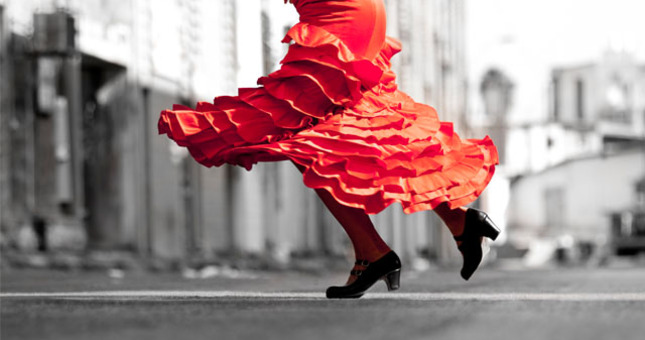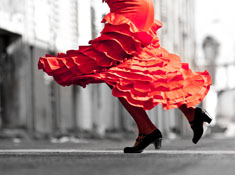
Constance Chan: Dancing to a Foreign Beat
I am female, Singaporean Chinese, and a flamenco dancer. Flamenco is the fiery song, guitar music, and dance of the Andalusian gypsies of southern Spain. If not for my MCS studies at Regent a few years back, I might never have stepped into my first flamenco class.
I have always been fascinated by the scene in Baz Luhrmann’s Strictly Ballroom (1992) of an older man dancing flamenco in a backyard next to train tracks. I knew I would enjoy flamenco dance, but dance is not a normal expression of celebration in my Chinese culture. We do not dance at weddings or festive gatherings. In the Chinese Christian circle I grew up in, there was hardly any dancing, not to mention theological reflection on dance. Maybe one could serve God through dance, but maybe not. Perhaps it was a healthy and fun activity if one was careful not to dress or move too provocatively. Taking expensive flamenco lessons seemed indulgent and frivolous.
At my second annual Regent retreat, however, I could not stop weeping as I received Holy Communion. God moved me to consider that perhaps dance was not, after all, something he merely tolerated. Perhaps it too was a good gift from our good Father, “for from him and through him and to him are all things” (Rom 11:36). I could not believe that God would give me a gift so joyous and dispense it so freely.
That was five years ago. I am a flamenco dancer now, yet this does not mean I perform professionally or regularly or that I teach flamenco vocationally, although I am serious in my study of flamenco, have performed some, and certainly intend to perform more.
No, I am a flamenco dancer because flamenco dance is how God gets through to me. The world marches to a different beat discordant with the music of God’s storyline—the gospel of our God pursuing and dying for us that we may be reconciled to him. My own past experiences and flesh incline me also to pagan expectations of possible abandonment by God. I therefore need to tell myself the gospel every day and flamenco is an important way in which I do this.
With footwork exercises, I marvel at the range of movement possibilities and distinct sounds of two feet touching the ground. As I train my feet to be more mobile, I am also realigned on a regular basis with God who created the human body good and is even pleased to inhabit human physicality himself in Christ. Flamenco is my regular defence against Gnosticism, an anti-Christian doctrine that believes the body is intrinsically evil.
As I dance, I am also opening myself to receive the mysterious joy of movement. I am tasting and seeing indeed that the Lord is good (Ps 34:8) not only in some abstract, general sense, but also personally—to me. I think of my immense satisfaction in watching over and over the video of my little niece Kayla scream in happy excitement at her own ability to stand up by herself. I imagine then how much more delighted my heavenly Father must be watching me dance. When I stomp out the distinctive loud flamenco footwork patterns with strong, assertive arm movements, I am practising the presence of my Abba Father who is delighted in me as his daughter even when I am doing something so apparently “useless” such as dance and even when I do not fit the Chinese classical feminine ideal that is quiet, soft-spoken, and unassuming.
Last October, I found myself dancing flamenco at a Chinese church in Madrid. A Spanish Christian student organized the event to thank the Madrid Chinese community for their participation in a dental study. The event was surprisingly grace-filled—mainstream Spanish educators, dentists, and university students honoured the marginalized Chinese immigrant community just as the inward-looking Chinese community honoured the Spanish dentistry community.
I am recognizing that God, in mediating his grace to me through the channel of a dance form so foreign, is blowing apart not only my cultural assumptions but also perhaps using me to challenge the thought categories and definitions of others, to open all of us up to new and more loving ways of responding to ourselves, others, and God.


